
We spend a lifetime having dreams, interacting with family, accumulating assets, living with risk, and then we die.
This article ties everything together to create a common-sense, low cost, no-fighting and income tax minimized estate plan.
Let me talk to you about twenty-five years of helping people take care of the people and causes they love after they are gone.
There’s No Quick Fix for Strategic Financial Planning in Canada
Recognize upfront, there is no one size fits all or any quick fix when it comes to estate planning and intergenerational planning. In even the most basic estates you are going to have to plan for the following:
- Significant and complicated income tax rules that affect income, assets, people, strategies countries, life and death. Perhaps the most significant single loss to an estate is the up to 50% income tax bill that can be due at the time of death if no planning is done.
- Canadian and foreign (US) tax rules that are constantly changing and require your estate plan to have a regular review to ensure that strategies are still relevant.
- Provincial estate taxes and fees (often called probate).
- Heirs to your estate that may be financially naïve, lack time to deal with your estate correctly, live far away, not get along with other heirs and end up fighting over money and personal possessions.
- Professional estate advisors and an executor can be expensive, biased, crooked, slow or don’t understand what to do in dealing with an estate.
- Legal rules, policies and procedures that may take years and hundreds of thousands of dollars in fees to resolve.
Do-it-yourself Wills, failing to speak to estate experts regularly, delaying planning because you are not going to die soon or failing to stay on top of rule changes can lead to devastating consequences for your family after you die.
Simply put… please don’t play games or cheap out when it comes to estate planning in Canada. It can destroy your spouse and family.
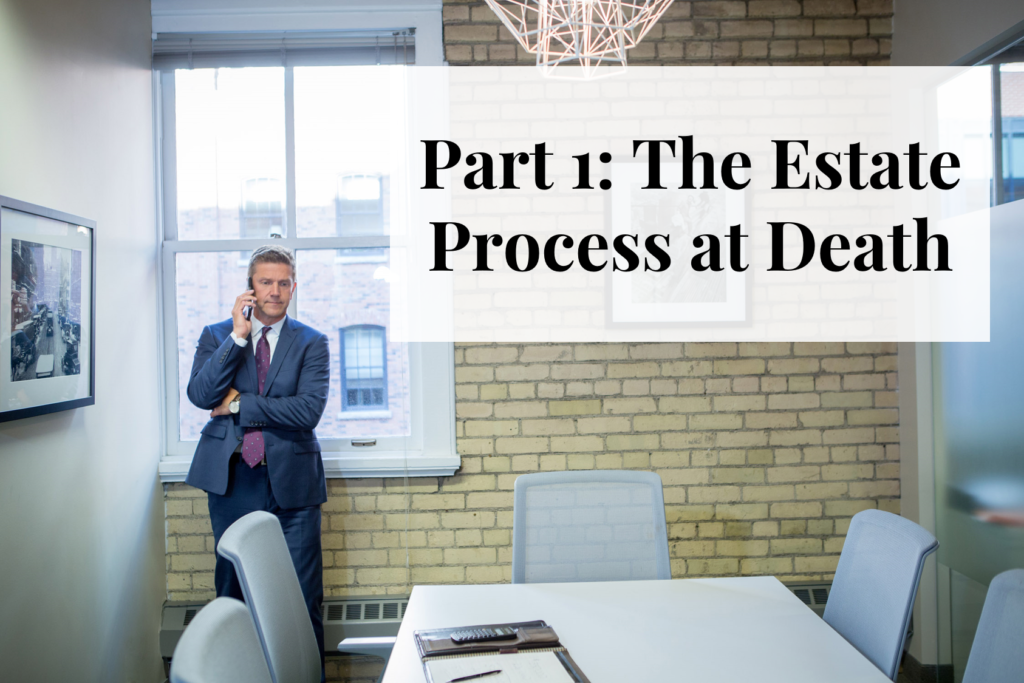
Understanding the Estate Process at Death in Canada
A family member died yesterday. What happens next?
Often family and friends are still heavily grieving, yet the estate work needs to start, unfortunately. The government, the taxman and financial institutions wait for no one.
1) How much will you pay for a funeral in Canada
Let’s hope the kids have $25,000 in their pocket because the funeral home wants their money fast. This factor is often overlooked because when the financial institutions are notified that someone is deceased, they freeze all assets. Banks, brokerages and insurance companies – all money institutions lock you out. There is no way to access money for funeral costs if they were not thought about beforehand.

Common Strategy: pre-planned funeral arrangements can make the funeral cost-free but this is not for everyone; more commonly folks have joint bank accounts with a spouse or kid(s) explicitly set up to pay for the funeral. The account has $10,000 to $50,000 in cash and can be accessed by the joint account holder after the death of the other account holder.
2) The Will Process
No one can do anything with the deceased person’s assets or debts until you establish who the executor is. You commonly state this detail on the front page of the Will.
But where is the Will? In the last century, you left your Will with the lawyer that prepared it or in a safety deposit box. No one does that today, and perhaps it never was smart – Lawyers retire and leaving the original with them never made sense. And unless you know where your parent’s safety deposit box is, have a key and permission, good luck getting anything out of it.
Safety deposit boxes have gone the way of the Dodo bird. No one has them anymore. Even the Canada Revenue Agency did away with the tax deduction for the annual fee.
Common Strategy: Keep an original signed copy of the Will at your residence with your other relevant financial documents. If you live in a personal care home, consider leaving an original signed copy with your executor(s).
3) The Executor
The Executor. Once the family or friends find the Will and read it, the Executor will be named. The executor is the person or people or institution in charge of dealing with the estate.
They can shut out the heirs and loved ones entirely until the estate is processed. They can change the locks on the home of the deceased. They don’t have to share the Will or talk about the estate – they control everything once identified. Suddenly, if you are not an executor, you are an outsider.

4) The Lawyer
Next, the lawyer. Find an estate lawyer within two weeks of the death. Any estate lawyer will do – misconception is that you need to go back to the lawyer that prepared the Will. This idea is wrong. Call a few estate lawyers and establish that they do a lot of estate work (ask how many estates they deal within a year). Get a fee estimate. Book an appointment and take the Will with you. Most of the estate processing will require the guiding hand of a lawyer.
As an Executor of a contentious estate, you want the objectivity and independence of a lawyer to help with all decision making. Don’t cheap-out on lawyer fees – they will help you get through the affairs at a time, whereas the executor you are legally liable for mistakes. Expect to visit the lawyer several times before the estate is done.
5) Probate on Assets
One aspect of the estate driven by the lawyer is to apply for provincial probate on all qualifying assets – basically everything the deceased person owns solely. You need to provide the lawyer with a detailed listing of every asset (financial, real estate, personal), and he or she will complete the probate process over the next few months.
This will pause all estate process since financial institutions, and land titles may not acknowledge the executor until they have a probated Will in their hand. Probate is the provincial approval that the Will is the final Will of the deceased, and most financial institutions will not move forward on releasing estate assets to the executor without a probated Will.
The probate fee varies by province but goes with 1.5% of the market value of all qualifying assets – this can include your home value. The lawyer will collect the probate cost payable by the estate from the executor.
A good lawyer will also provide guidance on asset distribution, payment of debts, disagreements between heirs, direction on dealing with taxes, international assets, small businesses and more.
A lawyer’s hourly rate of $300 to $500/hour should be expected. But not more than that.

6) The Residence
One tip: change the locks on all real estate owned by the deceased person. This tactic should be done by the executor fast. No one can enter alone and best to leave all contents until there is a plan for all stakeholders to meet after the probate process is complete. In other words, the home may sit untouched for three to six months. Make sure you cut the grass.
Some aspects of the estate shouldn’t wait for the probate process if the entities you are dealing with accepted just the death certificate you get from the funeral home. Call Service Canada to stop Canada Pension Plan and Old Age Security pension payments as of the date of death.
Continue to pay bills for utilities, property taxes and more even if it means using your own money – the estate will reimburse you once the payment is unlocked after probate is completed.
How Long Does the Process Take?
Many estate beneficiaries want their inheritance fast, especially if they are in dire financial straits. The executor, helped by the lawyer, needs to call a meeting with all heirs upfront and state they won’t get any money until the estate is wound up – meaning bills are paid, including all income taxes.

Income taxes won’t even be addressed for a year – so heirs need to appreciate it will be a while, and they should not hound the executor for money.
There is no such thing as a simple estate. I tell executors to expect to miss half a day of work each week for the first month of dealing with an estate. There is an endless number of tasks to accomplish, and they are the responsibility of the executor even if the work is delegated out.
Finding an Accountant
It would be best if you had a CPA to do the final tax return(s) of the deceased person. There could be several tax returns to do each year for several years. Estate work is specialty work so costs can run $300 to $400/hour. You need to dig into the deceased person’s past tax files and take them to the accountant – if they were using an accountant ask the accountant if they do a lot of estate work. If not, find one that does.
Spend the year collecting tax receipts, statements and working closely with the accountant, so you know correctly what to collect.
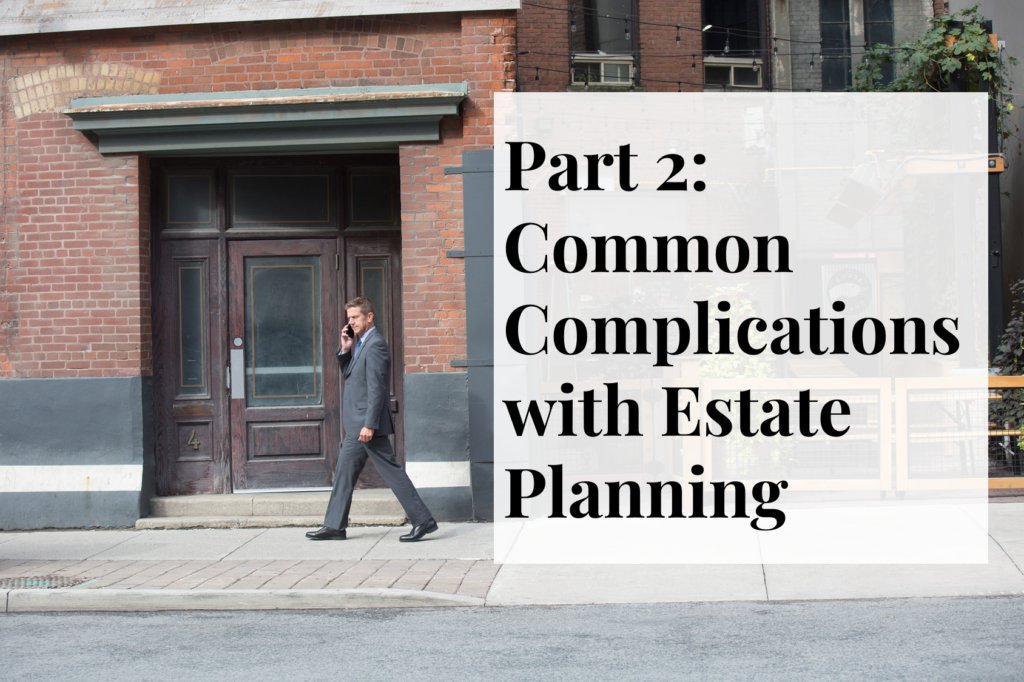
Complications in your Estate Planning
Limited financial or estate knowledge – ignorance is dangerous when dealing with an estate, and since most adults have never had a family member die it is often the case that heirs do not know the process, the costs, or how long it will take. All of this can cause stress between stakeholders during the estate period.
1) Owning a Small Business
A privately-owned business is one of the most complex features of dealing with any estate. With many investors, often considerable taxes to pay, tons of legal issues, illiquid shares to deal with and possibly no shareholder agreement, life insurance or estate plan for the business, dealing with a deceased shareholder can be a long process.
2) Special Needs Children
With any form of special needs situation (disabled children, drug addicts, spendthrifts and more), parents love their children and often want to plan for the need to take care of them for life. This means more advanced planning that builds a protective financial shell around the child that has to last decades.
3) Second Marriage
People are human, and if dad wants to get a girlfriend ten years after your mother’s death, who is to say this is wrong? Yet second marriage finances can mean dad’s second wife can jump ahead of the children from the first marriage for the inheritance when dad dies. Proper planning is essential in today’s complex world of relationships.
4) Wide age gap marriage
If a couple has more than a ten-year age gap, this not only presents retirement challenges in designing lifelong income, but this complexity continues in structuring affairs to provide for a surviving spouse that could live another twenty-five years.
5) Out of country assets
From a condo in Florida to that bank account in Hong Kong and the family homestead in England you now own, global assets mean your estate plan needs to be multi-jurisdictional considering tax laws, estate laws, currency and legal rules of foreign countries.

6) Illiquid assets
Artwork, a Wayne Gretzky rookie hockey card, private company shares, real estate, a veterinarian practice, a car and many other assets you may be set up to inherit may not have an easily definable value or a market where it can be sold quickly. It can take years to sell some assets people own. Are you ready to keep the estate open for years? You may have no choice if there is no estate plan today.
7) Family disagreements
Often caused when the deceased person didn’t leave a clear plan; also caused when heirs don’t like how the executor is executing the Will; second marriages where the asset division is disputed, created when an estate windup is taking too long and some heirs need the money – there are lots of reasons why families fight over money. And just as many ways to avoid this before death.
8) Another related death suddenly
My own parents died twenty-two days apart in 2011. Or a principal inheritor dies. Either way this adds another level of complexity to the estate process, likely doubling the number of lawyers, the amount of work, and how long the estate wind-up will take. Put your patient pants on!
9) Lawsuit
Someone has just died, and the last thing you expect is a lawsuit. But if an heir feels they were wronged, or an ex-husband wants more, a business partner wants to take over the business, get ready for a court battle that will run alongside the estate process.
10) Business dealings with no clear exit
You are a dentist and you co-own an extensive practice with another dentist. You also own the office building and land that the practice is in. You don’t have an up to date Will, no shareholder agreement with your partner, no life insurance to fund the estate transition, and then you die. Now starts a long process of business valuation, potentially a legal battle and significant legal fees that your spouse has to suffer through and doesn’t understand.
11) Unusual assets such as timeshares
Never buy a timeshare. When a person dies they can be impossible to get rid of, and the liability of making annual payments can go on for years. Let me repeat: never, ever buy a timeshare.
12) Children’s Debts
If you loaned money to one of your children over time, but you still want to ensure all the kids get equal shares of your estate then you need to build this debt owed by one child to you into your estate.
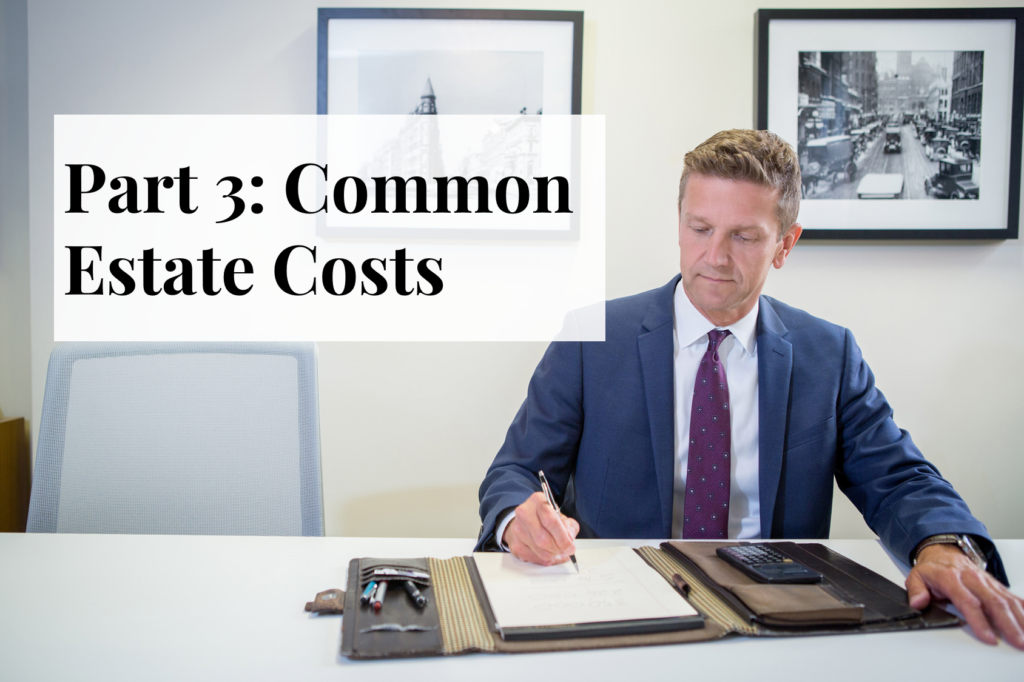
Estate Costs
There are a wide variety of costs that can be incurred while dealing with someone’s estate after death. Some of these costs are avoidable with proper planning while you are alive. Other costs are necessary, but you can manage them by knowing some of the rules of the game.
1) Time
It can take a lot of time to deal with an estate – dozens of hours over the course of two years at a minimum. Hundreds of hours if the estate is large, complex and contentious. Remember, as executor you oversee everything: cutting the grass at home, paying bills, managing investments, getting tax and legal work done, communicating with stakeholders, hiring experts and more.
Sure, having two or more executors can help to share the work (if they are in the same city and have equal financial smarts), but managing an estate is still a significant commitment that comes with personal liability for errors.
2) Probate
A fee of approximately 1.5% of the value of all assets owned by the deceased person that qualify for probate. This fee can include a personal residence. That means this fee can be in the tens of thousands of dollars if no probate planning is undertaken.
3) Income Tax
Income tax can exceed more than 50% in the year of death. There may be income tax at death on real estate gains incurred over decades, investment portfolio gains, a small business, interest from GICs and more. RRSPs and RRIFs are worse – they are fully taxable at death instead of just the growth. This aspect can often be the most significant tax bill of all.
There is no tax on death on life insurance proceeds — more on this below.

4) Executor Fees
Most Wills we review don’t mention compensation for the executor, and they should. If one family member does all the work, they should get paid market value for this. At least $100/hour given the risk they are taking on. But even if you don’t state explicitly that the executor gets paid, they can go to court if necessary and charge the estate with fee rates established in the province. If this happens, an excellent executor will provide a detailed summary of costs that the heirs can verify.
5) Legal Fees
Potentially one of the largest estate costs aside from income tax. That can be ok if the estate work requires a specialist lawyer (e.g. selling a business). But it can be abusive if the estate seems to get charged with an endless number of invoices at $600/hour for work that is not clear.
Hold the lawyer accountable for all fees by asking for a summary of what work was done. Expect to pay $300/hour or so. Replace lawyers that don’t communicate well, pass you off to junior staff or have excessive fees. Never try to do the legal work yourself.
6) Accounting fees
You are going to need an accountant to prepare the final, terminal tax return(s) for the deceased person – there can be multiple tax returns, and they may need to be filed for several years if the estate is kept open that long. The accountant may need to do a significant amount of forensic accounting around asset costs, foreign currency and foreign taxation. The work would go through the roof if the deceased person owned a business. Even a rental property is a business.
You can start by asking the deceased person’s existing accountant if they can do all the estate work and get a fee quote. But know you don’t have to stay with them if they are not qualified, have a high cost, or there are other accountants better suited to the estate needs now.
7) Real Estate Commissions
The executor is involved with decisions about selling the family homestead, a cottage, rental property, international property or business property. With taxes to pay, children heirs who may all want different parts of this real estate, foreign jurisdictions and other complexities, often selling real estate is part of the final plan. Fail to negotiate the lowest commission possible and beware an estate heir can come after you.
8) Valuation fees
These fees related to engaging professionals to determine fair market value on a piece of real estate or a business that needs to be sold or divided as part of the estate plan. In some cases, the fee to do a valuation (e.g. valuing an accounting firm or orthodontics practice) can be a five-digit fee. The executor is in charge of hiring these specialists as part of the estate process.
9) Banking and brokerage commissions
If the deceased person owned mutual funds, ETFs, bonds, stocks, GICs or other investment products, it is common to liquidate all of the portfolios as soon as the executor has a probated Will and can take control of the assets. However, because you are doing so many trades at once and depending on how the portfolio fees were set up, the exit trading commissions could be tens of thousands of dollars. Before you do any selling, you want to understand all of these costs and even whether heirs will take stock instead of cash.
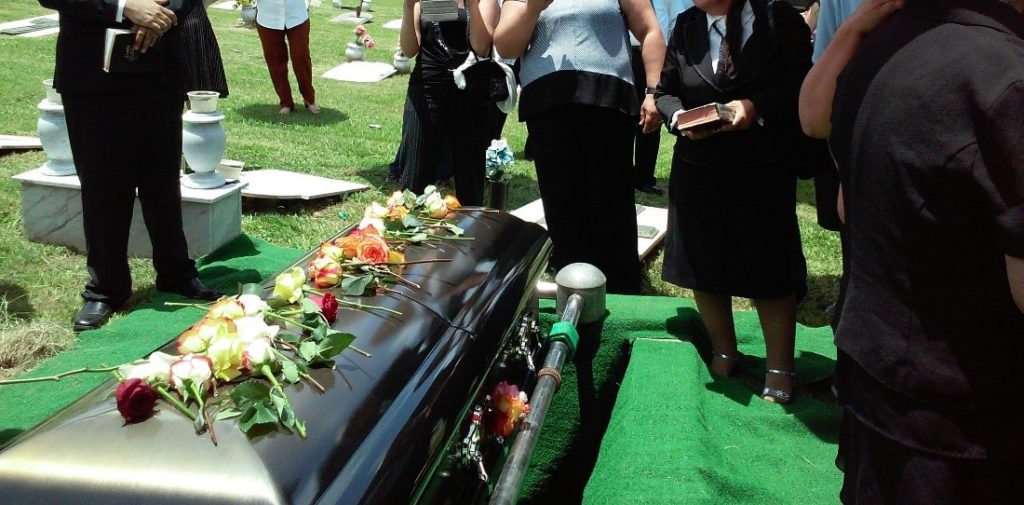
10) Funeral Costs
Funeral costs can be a few thousand dollars for a cremation, basic urn and no service to $50,000+ for a full-body burial and an elaborate service and coffin. Funeral homes are good at upselling, no matter what the intentions were of the deceased person. Best to make a plan today, including exploring pre-paid, pre-planned funeral arrangements.
So with this setup, let’s now look at strategies that people can consider to improve their estate planning from many angles – tax, practical, financial planning, legal and more – while possibly avoiding family fights along the way.
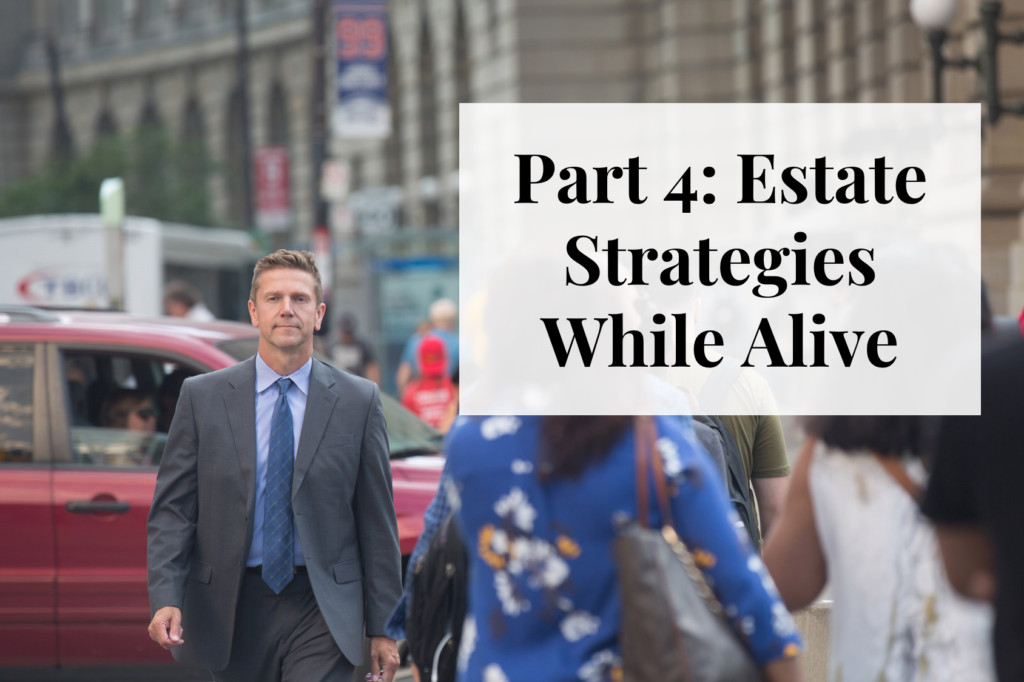
Estate Strategies While Alive
It is in everyone’s best interest to leave a clear, concise pathway for others to deal with their estate. The following strategies are a partial list to a long selection of options that should be discussed thoroughly with professional advisors.
1) Financial Power of Attorney
A two-page document that says who will pay your bills if you are left brain dead after a car accident. You should have this form in place at age 18 for life.
2) No Do-It-Yourself Ever
Estate planning is far too complex to cheap-out and complete a do-it-yourself Will at home. Spend less than $1000 on your estate documents through a lawyer and avoid family fights later.
3) Joint Bank Account
Someone may need to pay for your funeral. Unless there is a joint bank account with someone else, there is no way for people to access your cash once you die.

4) Organized estate files at home
In your home office, keep an accordion folder with the originals of all critical documents in your life. This sheet should include a page of your online passwords.
5) Teach your spouse
If you have managed the family finances for forty years, you need to teach your spouse what to do after you are gone. The kids won’t be around.
6) Teach your heirs
Most people have never dealt with death – never mind when it is a loved one. They have no idea what to do after the funeral and conflict will come easy when you are ignorant of the process. The solution is a team meeting today, chaired by an expert, not a family member.
7) All of the kids or none of the kids
It is common for people to name their adult children as the executor or back up executor. Rule: name all of the kids or none of them but never, ever pick a favourite.
8) Skip the Safety Deposit Box
People in the ’70s had safety deposit boxes to store their valuables. No one does this today. Even CRA took away the tax deduction for the annual fee.
9) Gifting
Giving away all your money and real estate before you die sounds like a great way to simplify your estate. And then your kid gets divorced or gets sued after a car accident. Bye-bye, potentially to your assets they hold.
10) Pre-plan your funeral
A must-do. Your kids will be burdened enough by your death. Besides, how will they know you want Elvis played at your funeral?
11) Joint Ownership
Joint ownership with your spouse, yes. Joint ownership with your kids no.
12) Know the tax bill
CRA (Revenue Canada) is poised to be the biggest inheritor of your wealth on death as taxes can be enormous in Canada. Smart tax minimization starts at age 60 and is focused on asset taxation and strategy, not income taxation. Your accountant is likely only focused on income taxation. Big mistake.
13) Life Insurance
Buy $2 Million of term life insurance at age 35 to protect babies. Buy permanent life insurance in your 50’s when you are rolling in money, retirement is taken care of, and you have no debt. Permanent life insurance is arguably the best tax shelter in Canada for passing wealth to your heirs tax-free. Just be careful what you buy and who you buy from!
14) U.S. Estate Taxes
Own significant amounts of U.S. stocks or real estate? Know if you qualify for U.S. estate taxes on death as the tax hit can be more than Canadian tax!
15) Family Trust
Great tool for protecting wealth from bad marriages, lawsuits, children who are spendaholics as adults, special needs kids and more.
16) Shareholder Agreement
The roadmap to unwinding a business you own – never fail to have one, update it regularly and ensure the liquidity is funded by the right kind of life insurance. Business owners more than anyone else need protection against the three D’s: death, disability and divorce.
17) Marriage Contract
I don’t care how much you love them – you’re a fool if you forgo a marriage contract for your second, third or fourth marriage. What’s worse for you – being penniless at 85 or leaving your kids with no inheritance because wife #3’s kids got it all?
18) Spousal Trust
You die. You leave everything to your spouse. They re-marry later in life. They die. They leave everything to their new spouse. Your kids get zero. How do you like that? Get a spousal trust today.
19) Old stock certificates
Please get rid of them now! It will cost you more in legal fees and postage to get rid of these after the owner dies than they may be worth.
20) Designating beneficiaries
Know that choosing a beneficiary on a brokerage RRSP application form, or a Tax-Free account means the assets do not go through your Will. So why did you create a Will?
21) Two Wills, maybe Three Wills
One necessary Will for the province you live in today and prepared in that province. A second Will if you own a corporation. A third potential Will if you own assets in foreign countries. Find out.

22) The hand-written note
Your Will does not contain account numbers, names of advisors, funeral instructions, or who gets your wedding ring or the picture above the TV. Your hand-written note summarizes all this.
23) Never use a trust company to help with your estate.
Trust companies will bring expertise, objectivity and the highest fees you have ever seen. You are far better off hiring a professional executor or an accountant or lawyer that does this work.
24) Up to date for recent tax law.
Most lawyers are not tax experts, and there is as much tax planning in a Will as there is legal wording. Make sure you calculate an estimate of taxes due in your estate every few years starting now and plan what you can do to reduce or defer these taxes. It would be best if you had an accountant to do this. And the accountant should review your Will too.
25) Get rid of the art now.
If you have hobbies that your family will struggle to liquidate (and they don’t want to keep no matter what they say today), then get rid of this stuff while you are alive and know what to do.
26) Any estate lawyer will do.
For some reason, people think they need to leave the original Will with the lawyer that prepared it, and their heirs have to go back to that lawyer to deal with the estate. That is insane. What if it is 30 years later? You need to keep an original signed copy at home, and the heirs can go to any qualified estate lawyer to deal with the post-death legal work. Please make sure they are an estate lawyer that deals with at least 20 estates a year. Ask about fees before you commit. Get a second opinion.
27) Children of Unequal Means
When your children have not all been equally successful in life, beware the dangers that can result as you age and die. Adult children can steal from the estate and justify the move as “they need it more.” Or your parents may look at the better-off kids today and leave them less. If you feel they will be wronged by getting the short end of the stick, then have the conversation today.
28) Leaving the family cottage
Never leave significant valuable real estate to kids equally on death. Have a shareholder agreement. Have a shotgun clause. Have a funding mechanism. Put money aside for costs after your death. And make sure the cottage can be forced sold by any kid no matter the emotional attachment the others have.
29) Beware estate abuse by professional advisors
Shady accountants and lawyers can fee gouge estates if they know no one is watching close or there is no close family at all. The court system protects the estate process, but people involved have to be on guard and ask the right questions.
30) Know what you are in for
Even a basic estate will take close to two years to wind up. The Executor will need to miss half a day a work a week for three months to do all the running around with estate processing. Besides personal legal liability for screwing up an estate an executor should know what they are committing to do before agreeing to play the role.
31) Never Make your Children’s Guardians the Money Trustee as Well
Unless you want your brother in law to have the ability to steal from your kids’ inheritance money after you both die suddenly, use different people in these roles as a check on each other.
32) Review estate documents every five years
Your estate wishes and the people you name may not have changed, but tax rules, legal process, provincial rules, and international tax continually evolves. It would help if you examined your plans periodically to ensure they are still optimally laid out according to the current set of rules in a variety of regimes.
33) A good estate coach is worth their weight in gold
You died. Your family is upset. Your spouse is scared and never managed the money – you did. One of your kids needs to get back to work after the funeral. Another kid lives in another province. And the third kid is not good with money. Engaging an estate coach to help your family deal with all the estate work over several years is valuable and peace of mind to you today. For a few thousand dollars, an objective, non-blood expert can get the estate work done and reduce stress, conflict and cost.

Next Steps
There are no short cuts to proper estate planning. It takes a coordinated effort between you, an accountant, a lawyer and a financial planner to come up with a comprehensive plan that addresses end of life and inter-generational issues.
Never put this work off. Our time on this Earth is unknown. You owe it to your loved ones to leave them a well-crafted plan.
Kurt Rosentreter, CPA, CA, CFP, CLU, CIMA, FCSI, CIM, FMA, TEP is President of Upper Canada Capital in Toronto and a Senior Financial Advisor & Portfolio Manager with Manulife Securities. Kurt is the author of seven books on personal finance and a money management course instructor for accounting associations across Canada. Kurt is the past co-founder of the billion-dollar wealth management practices at one of Canada’s “Big Four” global public accounting firms. With more than twenty-five years of professional experience in Canadian wealth management Kurt is a popular public speaker nationally and can be regularly found in the national newspapers as an expert on personal finance. Kurt has published more than five hundred articles on money in the last two decades, and his hard-hitting newsletters are popular with Canadians. www.kurtismycfo.com
Kurt Rosentreter is the author of “Wealth Building, Lifelong Financial Strategies for Success with Your Money (Revised Edition)” (2009); Wealth Building (2005); Rosentreter’s Rules 100 Financial Strategies to Achieve High Net Worth (2001); 50 Tax-Smart Investing Strategies (1998); 50 Tax-Smart Investing Strategies (Updated 1999); 50 Tax-Smart Investing Strategies (2002); 50 Tax-Smart Investing Strategies (2004). Manulife Securities has not created nor endorsed this book or any of its contents.
Any opinions, advice, statements, services, offers or other information contained in this book are those of the author and not of Manulife Securities or any of its affiliates.”Manulife, Manulife & Stylized M Design, Stylized M Design and Manulife Securities are trademarks of The Manufacturers Life Insurance Company and are used by it, and by its affiliates under license.




